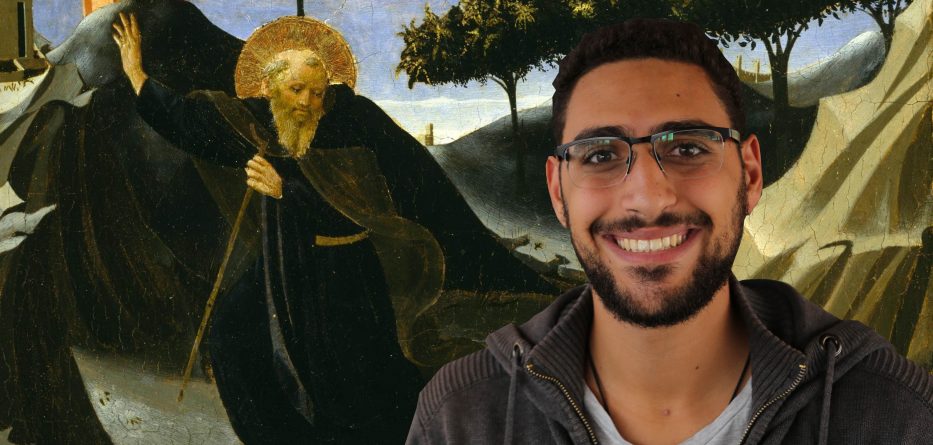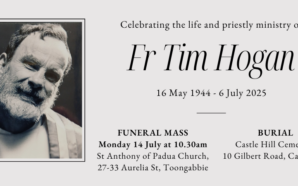The Growing in Holiness article series shares the stories of Catholics in the Diocese of Parramatta who are striving to grow in holiness through the means provided by the heritage of the Catholic Church.
The Catechism of the Catholic Church states in paragraph 2013: “All Christians in any state or walk of life are called to the fullness of Christian life and to the perfection of charity.” (LG 40 § 2) All are called to holiness: “Be perfect, as your heavenly Father is perfect.” (Mt 5:48)
Matthew Dimian is a seminarian of the Diocese of Parramatta, whose Coptic Catholic background gives him a deep and somewhat unique perspective on fasting and Lent.
Coptic Catholicism has a rigorous and beautiful tradition of fasting, a practice that is neglected but remains of universal significance to Christians seeking to grow in holiness.
St Thomas Aquinas wrote that there are three purposes to fasting: self-discipline, contemplation and reparation.
Matt notes all of this is easier said than done.
“I struggle very much,” Matt said.
A general principle for fasting is that it should be about challenging oneself to grow in charity. Any fasting practice that is destructive should be stopped.
The beauty of undertaking a simple fast on Friday, perhaps limiting oneself to a small meat free meal, is that it symbolises dying to the flesh with Our Lord in the Crucifixion. This is a way to prepare for Sunday Mass, when the faithful rise triumphantly with Him.
RELATED: Coptic Catholic Patriarch’s Australian Interview
Fasting is not about personal glory or pride but rather humbling the natural proclivity to rely on personal resources and natural means.
Matt points to the example of St Francis of Assisi reducing the intensity of his community’s fast for the sake of a brother who could not fast as intensely as the others. It is about growing in charity and love for God, others and self, by denying self.
As a young child, Matt observed his family fasting regularly and intensely.
“I think the Coptic tradition requires fasting for more than two thirds of the liturgical year,” he said. These days of fasting include Lent, Advent, all Fridays and days leading to major feasts.
“Coptic Catholics abstain not just from meat, but also from dairy, egg, and all other animal products.”
Matt began Lenten fasting and abstinence during primary school, encouraged to give up chocolate or video games.
“As I went into high school, I realised that fasting was an opportunity to grow in strength of will and self-control. So I made Lenten fasting a personal challenge. How much can I give up? How long can I go for without succumbing to temptation? And I realised that fasting and penance was not limited to Lent.”
As he matured, he realised fasting solely as an exercise in self-control was a very incomplete understanding of fasting.
RELATED: Parramatta Coptic Catholics celebrate Papal Visit
Matt said that material things should be replaced with things of the spirit; fasting without prayer is simply dieting.
“I noticed it is surprisingly liberating in the midst of it.”
He has felt his spirit lighter and turning towards God easier while fasting. It has also helped him resist temptation and overcome vices.
It is connected to the biblical concept of the desert, where the faithful are alone with God, without natural aids. It reveals people’s foibles, weaknesses, and the spiritual struggle with the Devil.
This is a reality picked up in popular culture, such as in the award winning Snicker’s Bar campaign, You’re not you when you’re hungry.
Matt first notices a sense of weakness, aimlessness, restlessness and distraction when starting to fast.
“In these moments of voluntarily weakness, I’ve turned to the Lord,” he said.
And after persevering beyond these initial temptations, with a steadfast focus on the Lord, he was surprised to find himself energised spiritually.
“Perhaps with less energy overall but more focused on Our Lord and a dependence on Him in conversation and thought.”
Matt says there is a highly developed theology of fasting for some of the aforementioned reasons. Scripture and the Church consistently recommend fasting as one of the most powerful ways of doing penance.
“I think food is the most powerful form of fasting, most recommended by the Church’s tradition, because food gets to the heart of our being,” Matt said.
Mankind fell through eating the forbidden fruit and is redeemed by the Body and Blood of Christ.
Matt shares that “Food is what keeps us alive, it is what nourishes us, preserves us. By giving up food, we are saying ‘I love you, God, more than I love my own life.’
“God calls us to infinite and unending relationship with Him, where we can find the fulfillment of all our desires.
“He gave us the created world to direct us upward toward Him. Creation points to its creator. But a constant temptation in this world is to get so distracted by the creation that we forget the creator.
“We get so engrossed in the world, that we forget the one who made it for us, so we are in constant need of conversion.
“Think of a person who would rather stare down at his smartphone than spend time with his friends. Or a husband who watches television to the neglect of his spouse.”
Holiness is setting something aside for God alone, and nothing else.
“Fasting makes us holy,” Matt said.
“This is something we understand instinctively. When we walk into a beautiful Church we perceive that the Church is a place reserved for worship of God alone, we know we cannot use the church for common conversation. We whisper as a response.
“We Christians are supposed to be holy too, set aside for God alone. Since we have been baptised into Christ Jesus, we belong to God and to no one and nothing else.”








